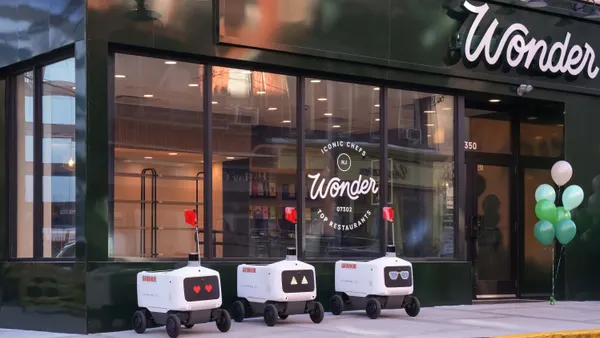Dive Brief:
- Canada's primary airport, Toronto Pearson, has joined forces with Uber Eats and global restaurateur HMSHost to test food delivery in its Terminal 3 International and Domestic Departures section, according to a press release. The pilot program will last through the third quarter of 2019.
- Passengers can access this service via the Uber Eats app on either an iOS iPhone or Android. Users will be able to choose from an array of QSR and fast casual airport restaurants, including Wendy's, Starbucks, Subway and Smashburger.
- "Uber Eats' partnership with Toronto Pearson is a perfect example of how our platform is creating unique experiences in unexpected places, beyond rides," Marcus Womack, Head of Global Airport Products at Uber, said in a release. "We're making the dining experience a more convenient part of travel, in one of the world's most innovative airports, one meal at a time."
Dive Insight:
Given the scale of Toronto Pearson, which is a whopping 4,613 acres, and the myriad of food vendors found in Terminal 3, this collaboration with Uber Eats and HMSHost could save travelers a lot of time during pre-flight preparation.
While Womack suggested that the deal is an offering that's unique to Uber Eats, the concept isn't exactly a trailblazer. Baltimore/Washington International (BWI) Airport partnered with airport delivery service Airport Sherpa back in July 2017, and San Diego International teamed with a similar service called At Your Gate later that year. HMSHost isn't new to the concept either, as it has launched a mobile cart called Food Cycle that delivers food and drinks at airports in Memphis, Maui, Honolulu and Chicago.
This is the first time, however, that Uber Eats has dipped its toes into this emerging delivery segment. It's certainly the biggest brand name among the players that are offering their services in airports, and if the test in Toronto goes well the service could help it differentiate in the U.S. market (if it can score partnerships with stateside airports). Whether or not airport delivery could be a meaningful path to growth for Uber Eats is unclear, but the pilot reflects the pressure to differentiate in the third-party delivery space. If the pilot rakes in meaningful sales, competitors like Grubhub and DoorDash may angle for airport partnerships of their own.










